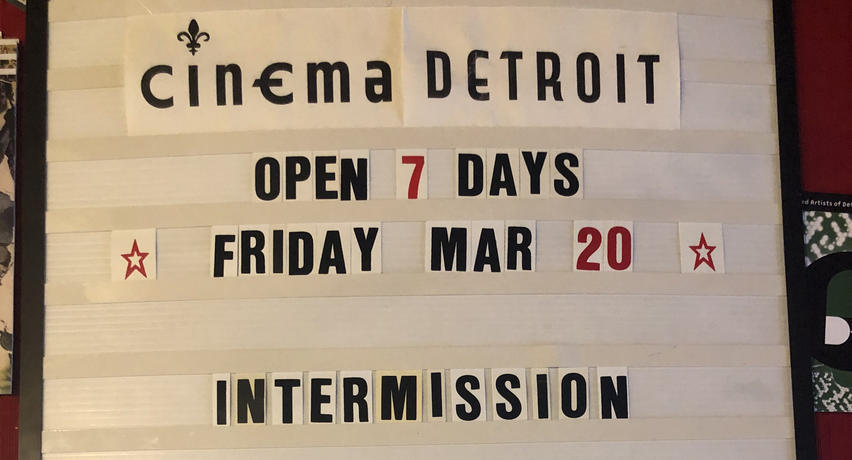
This article was originally published on March 23, 2020.
There’s a sign on the door of Paula and Tim Guthat’s independent movie theater in Detroit. The first words you read are “Open 7 Days.” But as your eyes continue down the Cinema Detroit sign, there’s a date: March 16. And then, “Closed temporarily.”
After operating daily for nearly a decade and growing a loyal customer base, the small business owned by the couple — who met during Professor Emeritus Sidney Bolkosky’s film class at UM-Dearborn in the early 1990s — still has the faint smell of popcorn, but no one’s in the cushy red seats.
Last Monday, March 16, Governor Gretchen Whitmer issued an executive order that closed theaters and other "places of public accommodation" like gyms, restaurants and performance venues to enforce social distancing in an effort to slow the spread of the potentially deadly coronavirus. And at 12:01 a.m. Tuesday, March 24, the State of Michigan issued a Shelter-in-Place order, which restricts nonessential travel.
Paula Guthat says she understands the governor’s decisions — and the Guthats planned to close even before the first order was given based on the rapid increase in COVID-19 numbers in the U.S.
“Over the (March 13-15) weekend, things were starting to sound like they were evolving into 28 Days Later. It made us wonder if this virus was more serious than we were first led to believe,” says Guthat says referencing the 2002 British post-apocalyptic film. “We made the decision to close following our Sunday showings. Our theater was full and people wanted to be there. We were second-guessing if we made the right choice until the governor's March 16 announcement. So we were right in closing, but it doesn’t make this time less tough.”

College of Business faculty member and entrepreneur Tim Davis says thousands of people are in the same position as the Guthats and “there’s no easy answer.” But there is a silver lining in this: “Entrepreneurs are creative people who often come up with customer solutions. It’s who they are and what they do. When it comes to solving problems, entrepreneurial thinking is a good place to start.”

In the past, Davis owned a construction business. He recalls being at a building site on Sept. 11, 2001 when a customer told him about the planes crashing into the World Trade Center. The COB assistant dean for Student Engagement and Success says he understands how a crisis may impact a small business, but also understands that what people are experiencing today is unprecedented. “I’d like to sound cheery, but this is a huge blow to our economy. We get why, but it still hurts.” But his experience reminds him that small business owners are “nimble problem solvers, the jacks and jills of all trades.”
With Davis as a guide, here’s some advice that may benefit your small business.
Offer your product in a new way.
Look for ways to collaborate with another business to help each other. For example, maybe you own a cooking studio that’s closed and you know someone who owns a video production studio that may be slow on business. Work together with the support of a local grocer to make a video on how to cook up comfort food. Davis says working together — at a socially safe distance — and pooling together resources, expertise and customer bases can be a win-win.
Davis says it’s also important to reach out to your customers and check in with them on what services they’d like during this time. “Listen to the people around you and empathize. See what they need. You started your business because you saw there was a need and you filled it. Use your natural creativity and business savvy, your entrepreneurial thinking, to find ways to provide a value-added service. It’s a trying time, but small business owners often excel in this way of thinking.”
Know there is help out there and apply if needed.
Davis shared a few financial aid links, including this one from Michigan Economic Development Corporation, that Michigan’s government is sending out to help mitigate the strain that the shutdown has on businesses. The Michigan Small Business Relief Program will provide more than $20 million in grants and loans to support businesses and the Michigan Small Business Development Center can provide resources. Many of the funds are expected to be available by April 1.
There’s also help for Detroit businesses through TechTown Detroit’s Detroit Small Business Stabilization Fund. Capital grants for qualifying business go up to $5,000.
In addition, Whitmer announced Thursday that the U.S. Small Business Administration (SBA) has a statewide Economic Injury Disaster Loan declaration through FEMA’s disaster assistance.
Stay on the minds of your customers.
Davis says there are many ways an entrepreneur can add and capture value. It may not be a monetary transaction, but there are still ways to add value and stay top of mind with your customers.
If you have the capital, you can invest in ideas that you’ve had in the past, which you now may have more time to implement. If the money isn’t there — and many people are in this category — you can demonstrate what makes your enterprise unique and important by showcasing it through avenues that you already use. “If you don’t have a virtual presence on social media because you haven’t had the time to manage one before, now may be an opportunity to strategize content and set one up.”
Zoos are closed, but many are showing off what makes them great — their animals and highly-trained staff — through online educational videos that are aimed at children who are currently home. Concert venues are silent now too — so entertainers are creating recorded content to share through their social media channels. “Many businesses already have virtual audiences. Continue to use that as a way to interact with people, but refine your strategy. It’s a way to build trust and confidence with your customers.”
The Guthats are using videos and social media, but they are using other approaches too. They are using online mailing lists to write customer-focused emails and finding new ways to offer their services (for example, adding to membership perks, offering “tickets” to virtual cinema screenings for arthouse films and opening the concession counter for carryout). She also says people have reached out to ask how they can support the theater, so Cinema Detroit began offering gift cards online.
“We know that shutting down is the right thing, but small businesses are more than a place of work for many of us, it’s our lives. So this is a scary time, but people want to help. They understand that small businesses are in a really tough spot, so it’s important for business owners to stay connected with customers and let them know how they can help if they’d like to. We are all in this together.”

On Friday, Paula and Tim Guthat went into their theater to create social media content and do some cleaning. But before they left, they changed their sign.
It now reads, “Friday, March 20...Intermission.”
“I’m still processing this, I’m trying to stay positive — so I changed the sign,” Paula Guthat says. “We want our customers to know that we’ll be back. There are ways we, as business owners, can survive this and come out stronger on the other side. After all, the show must go on.”




